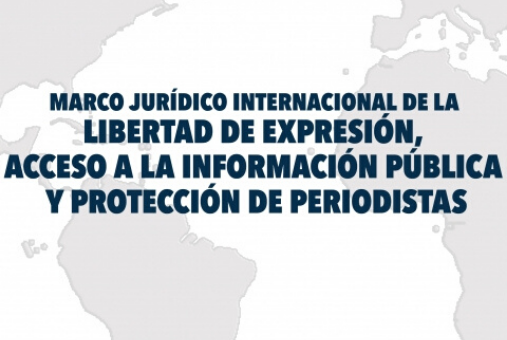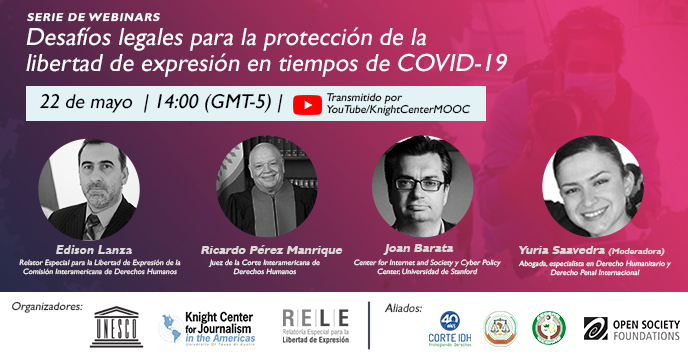Seven years ago, when the design started for the course, “International legal framework of freedom of expression, access to public information and journalists' protection,” Guilherme Canela, head of the Unesco section on Freedom of Expression and Security of Journalists, remembers that there were many uncertainties.
Unesco in partnership with the Special Rapporteur on freedom of expression of the United Nations and the Inter-American Commission on Human Rights thought of partnering with the Knight Center for Journalism in the Americas to carry out a massive, open and online course (MOOC) as part of the so-called Judges Initiative.
“The certainty was that judges, prosecutors, public attorneys and other judicial operators are key actors to protect and promote freedom of expression, access to public information and the safety of journalists - a conviction that remains the same,” Canela told the LatAm Journalism Review. “Among the many doubts, one that particularly concerned us was how the Ibero-American judicial officers would react to our proposal for dialogue and exchange of knowledge.”

The Judges Initiative’s goals was to conduct different training for magistrates and other judicial officials of the region with international standards of freedom of expression. The MOOC, which is organized by the Knight Center for Journalism in the Americas at the University of Texas at Austin, is part of this initiative.
To the surprise of the organizations, the course was very well received.
“Seven years later, this has surpassed our most optimistic expectations. Between online strategies, like the MOOC, offered in cooperation with the Knight Center, and other [in-person] educational spaces, we have interacted with more than 15,000 judicial officers from all the countries in Iberoamerica. 15,000!” Canela emphasized.
The Knight Center’s MOOC “International legal framework of freedom of expression, access to public information and journalists' protection,” and its 2020 edition trained almost 12,000 of those 15,000 judicial officers of Iberoamerica, mostly from Latin America.
The pilot test for this course, which is the only one of its kind at the moment, was launched in 2014 and was targeted exclusively to judicial officials of Mexico and had the participation of 931 officials from that country. In 2015, the course was offered for the first time to the rest of Latin America with the support of the Ibero-American Judicial Summit, the Ibero-American Network of Judicial Schools and the Swedish Government in an edition that had the participation of 1,299 judicial officials.
An edition of the course has been offered every year since 2015 without interruption. However, since 2016, in addition to judicial officials in Latin America, public officials from Spain and Portugal have also participated.
That year 637 people participated. In 2017, 2,200 judicial operators took the course. The following year the number of participants rose: 2,418. In 2019, 2,146 applicants were accepted. Finally, this year, 2,348 people took the course.
All the countries in Iberoamerica have participated in at least one of the editions offered.
Likewise, and throughout each year, other organizations have joined to offer their support. In addition to those that joined in 2015, the Foundation for Press Freedom (FLIP) from Colombia, the Latin American Internet Association, National Endowment for Democracy (NED), the OAS School of Government and the University of Los Andes from Colombia.
“Seven years later, we are happy to see that judicial powers, public ministries, judicial schools, public prosecutors and lawyers, regional courts are strongly engaged in this very relevant discussion,” Canela added. “The challenges faced by the freedom of expression continue to be very present in all of our countries and, because of that, we hope that the knowledge shared throughout these years and that the judicial officials that participated in these debates will continue to be pillars of the protection of these rights that were universally built in the last decades.”
Ana Jacoby, a mexican lawyer who participated in the 2020 edition, agrees.
“The course allowed me to systematize and broaden my knowledge about the interamerican standards on freedom of expression. The modules are well structured and the instructors are unbeatable, since it combines the master classes of Rapporteurs for Freedom of Expression with the personalized follow-up of those who moderate the different forums,” Jacoby told LJR. “Along with the issues in which there is already jurisprudence within the Inter-American Human Rights System, cases related to emerging rights such as certain digital rights and current issues are also dealt with, such as the impact of the Coronavirus pandemic on the right to free expression.”
“In addition to its enormous value for the training of judicial operators, the course has enormous potential for training those who design and implement public policies, as well as for those who investigate this problem,” added Jacoby.
“I am thankful to have participated in this course and to finish it successfully, having acquired a lot of knowledge that will surely help in our roles that we perform every day,” said Janneth Villa, of the Ecuadorian prosecutor's office. “Doctors Catalina Botero and Edison Lanza are excellent speakers who in a practical way know how to teach students and who continue to impart their knowledge for the benefit of professionals with the need to continue expanding our knowledge.”
Freedom of expression and COVID-19
The development of the 2020 MOOC edition was also marked by the COVID-19 pandemic. As has been denounced by organizations of freedom of expression throughout the world, the pandemic has been used as an excuse to block access to public information or in general to obstruct the work of journalists and of the Judicial power.
In order to address these issues, the Spanish-language webinar “Legal challenges for the protection of freedom of expression in times of COVID-19” took place. Experts identified the main challenges that freedom of expression faced in the middle of a crisis generated by the COVID-19 pandemic while guaranteeing international standards of freedom of expression, privacy and access to public information.

Courtesy UNESCO.
The webinar had the participation of Edison Lanza, Special Rapporteur for freedom of expression of the IACHR and instructor of the course; Ricardo Pérez Manrique, judge of the Inter-American Court of Human Rights; Joan Barata, Spanish expert at the Center for Internet and Society and Cyber Policy Center at Stanford University; and Guilherme Canela, head of the Unesco section on Freedom of Expression and Security of Journalists. The moderator was Yuria Saavedra, a Mexican lawyer specialized in human rights, humanitarian law and international criminal law, and she was also an instructor of the course.
The event via Zoom was held live on the Knight Center’s YouTube channel on May 22. To see the full event, click here, and to read a summary of the webinar, click here.
Self-directed version of the course: more benefits
During all the editions, the interest in the course from people who were not operators was clear. So that the knowledge taught for the last seven years could reach more people, the course “International legal framework of freedom of expression, access to public information and journalists' protection” has a self-directed version.
This new version follows the style of the Knight Center’s self-directed courses. Once the open course ends, the material is reorganized as a self-directed course and becomes available on the Knight Center’s new distance learning program portal, JournalismCourses.org.
The self-directed courses are different from those led by instructors in that those do not have due dates and do not count with the presence of an instructor, assistant instructor or any other figure leading the process. In that sense, these courses do not have exercises or forum discussions.
However, the theoretical part of the course is available to anyone interested in studying it. In the case of the freedom of expression course, the instructor Catalina Botero’s video classes are available. Botero is dean of the School of Law of the University of Los Andes, joint judge of the Constitutional Court of Colombia and former rapporteur for freedom of expression of the IACHR. She has been an instructor of the course since the pilot version in 2014.
Edison Lanza’s video classes are also available. Lanza is the current Special Rapporteur for Freedom of Expression of the IACHR and joined the course in 2017.
Likewise, people who decide to study the self-directed version of the course will have access to the readings that complement the study program. Like the instructor-led course, the materials are divided into six thematic modules.
This story was originally written in Spanish and was translated by Perla Arellano Fraire.